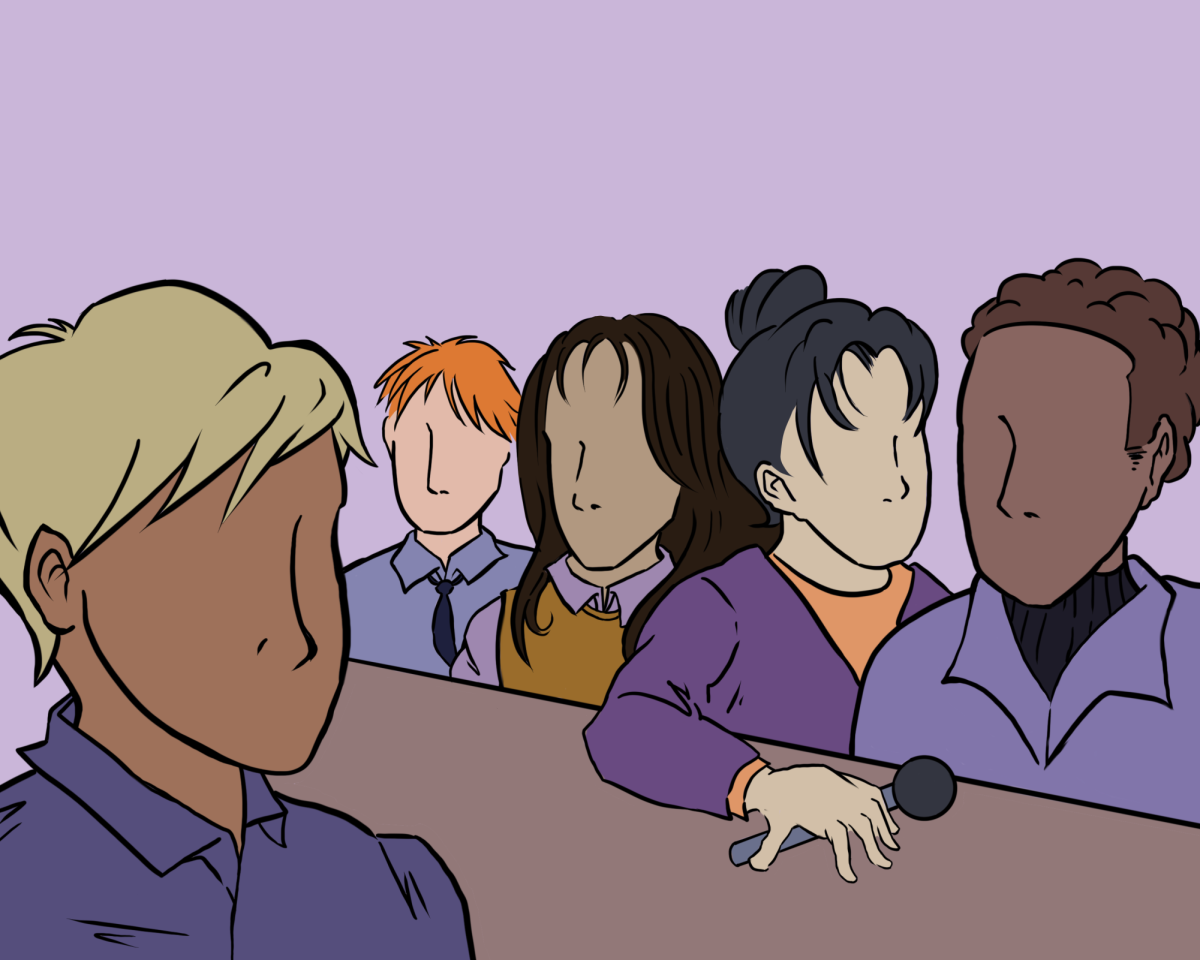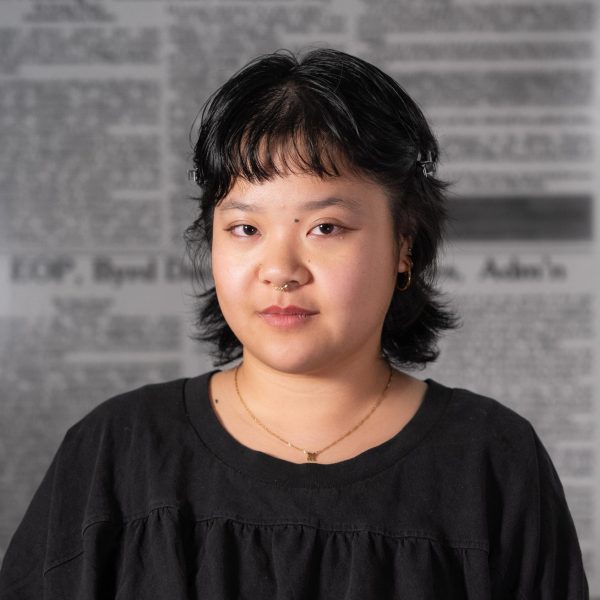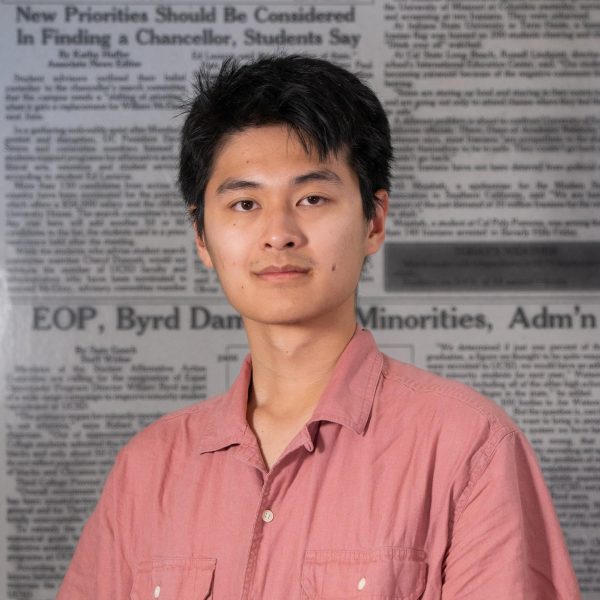A.S. President George Chi Ioi Lo released a statement on Monday, Oct, 23 affirming his commitment to diversity after being requested to publicly apologize in an internal A.S. statement for his behavior towards four senators of color during a presentation given at the Oct. 18 A.S. Senate Meeting.
The “ASUCSD Latine Student Org Conference Fund” presentation was a general pitch for a fund devoted to Latine student organizations for academic and professional conferences. Created in response to a public comment asking for funding made at the first senate meeting by A.S.-funded Latine student organizations, Off-Campus Senator Marysol Valdez, Off-Campus Senator Elizabeth Lopez, Campus-Wide Senator Christina Green, Campus-Wide Senator Alex Lujan, and Transfer Senator Mercedes Limon (absent during the presentation) created this project in order to meet Latine organization needs, citing UCSD’s obligation to them as a rising Hispanic-Serving Institution.
“It’s a very preliminary project, it was an idea we had,” Valdez said, contextualizing the presentation. “A lot of the specifics in terms of funding requests, where those funds will be pulled from, the conference list, those weren’t set in stone. We just simply wanted to see what Senate thought, and bring this idea to light.”
The authors describe Lo’s conduct towards their presentation as belittling, disrespectful, and insolent, citing three timestamps from the meeting. The letter requested a written apology from Lo to be published as an Instagram feed post for at least 24 hours on both his accounts (@asucsdpresident and @georgechiioilo) by Monday, Oct. 23, and a verbal apology to be read at the next senate meeting on Oct. 25. They asked that this apology would also be emailed to the presenter senators and professional staff member Alfredo Barcenas ahead of time, by noon Sunday, Oct. 22, for approval and proof of sincerity.
In addition to the project’s co-senators, the letter was also signed by the UCSD Society of Hispanic Students in Law (SOHIL), MEChA de UCSD, A.S. AVP of EDI, La Familia, and other Latine Orgs.
Lo said he was unable to respond to the letter by Sunday, outside of business hours, given his desire to consult with professional staff and administrators.
“I think it was over-the-line that they tried to ask for an apology because once the President apologizes, it sends out a very strong message,” Lo told The UCSD Guardian.
Lo expressed concerns about impeachment and recall, damage to his public reputation, among other worries.
“They want to see the President apologize, basically admit that he’s a racist, and so many of the students would hate him and be open for impeachment,” he added.
Lo said that his conduct at the meeting was not motivated by blocking the fund, but rather his commitment to EDI.
“I was trying to advocate for all the students, because the fund was only specifically for one group of people,” he said.
On Monday evening, Lo posted an Instagram story to @asucsdpresident and emailed the same statement internally to the A.S. listserv. In his statement, Lo spoke broadly to his commitment to inclusivity and disclosed a medical condition that he believed the letter authors interpreted as disrespect.
“I’m a first generation immigrant and college student, I need to read at a slower pace … I have my own language barrier,” Lo said.
The letter signers were not offered an opportunity to review or approve the statement ahead of time, nor have they received any personal apology or communication from him. Having read the statement at the time of its public release, the signers said that they did not approve and found it insufficient and insincere.
“All we ask is an apology, and also acknowledging the actions that he has done … We’re asking for basic human decency, and even then, we didn’t even receive that,” Green said. “[His statement] wasn’t an apology at all … There was no ‘I’m sorry.’”
The first two examples given of Lo’s conduct occurred during the presentation, where POC student representatives requested the “undivided attention” of the senators after observing them “checking emails” and “sending texts.” In the second clip, the speaker specifically named “the President” as being distracted.
The third timestamp occurred during the question-and-answer portion of the presentation, showing Lo asking several questions in succession, rejecting the speakers’ request that each question be asked one-by-one.
“It was just blatant disrespect … that ‘no,’ it shook me, I wasn’t expecting it,” Valdez explained. “If you look at my response, everyone else’s responses around me, we were all in shock … To have the President say that you don’t deserve to officially answer your questions — it’s embarrassing, it’s disheartening.”
“Rather than having question time, when it comes to President Lo, it was much like being attacked. We were belittled,” Lopez said. “I broke down after that meeting … I’m a first-generation college student, and now I have a daughter … I don’t want her to see me be embarrassed.”
Lo believes he spoke calmly and did not intend to disrespect the senators.
“I watched [the video] myself, I would say that I could have delivered it better, maybe make my questions more concise,” Lo said, explaining that the short time frame makes it difficult for him to ask all his questions and reclaim time. “They paused me in the middle, which they aren’t supposed to do … so I said ‘Oh no I’m not finished yet’… I shortened my questions.”
Lo’s first three questions asked for clarification regarding a similar conference fund created last year by former AVP of EDI Cristian Fuentes-Hernandez that the presenters had pointed to as inspiration for their fund this year.
“The fund by EDI office last year had a history of misusing funding,” Lo told The Guardian, describing an unofficial investigation that was conducted into the conference trip last year. Lo said that they looked into the possible misappropriation of A.S. funds for personal travel by last year’s attendees. Lo cited extra nights of hotel stay, as well as Instagram photos in Times Square when the conference was in Newark.
“Most of the people that went on the trip were close friends or have close connections with the AVP, and the trip was planned very late,” Lo said, explaining that his line of questioning during the senate meeting addressed these problems.
Fuentes-Hernandez, who ran for President against Lo and is now retired from A.S., rejects these claims, saying that Lo’s comments at the meeting slander his name.
“He made it sound like a vacation trip,” he said. “I notice some prejudice from George when it comes to minorities. Just because we’re Latinos, doesn’t mean that we all are besties. That’s an assumption I really dislike.”
Fuentes-Hernandez clarified Lo’s nepotism claims, stating that he was actually unfamiliar with many of the participants. The remaining individuals were Latine student organization leaders with whom he had a professional relationship in his role at EDI.
The Guardian was not able to obtain any record indicating that Fuentes-Hernandez misappropriated funds for the conference trip.
Other questions Lo asked about the credibility of a conference’s website further questioned whether this expenditure was necessary at all. His final question inquired how this fund would support non-Latine identifying students, asking if implicit bias was at play in the conference registration process.
Valdez stated that many of the answers to his questions were emphasized before questioning time.
“We answered a lot of his questions throughout the presentation. We bolded it, and it was inserted into the presentation,” Valdez said. “Respectfully, if he had listened to the presentation thoroughly, he would have had most of his answers.”
After the Oct. 18 Senate meeting, Green and Lo had a private conversation in the room regarding his conduct.
“I tried to bring it up, and he was like, ‘I didn’t do anything wrong, I don’t know why you guys are upset about this, why should I give an apology.’ I just knew right then and there it wasn’t going to end well,” Green said.
Lo said that when Green mentioned after the meeting that he was going too fast, he apologized.
“I did say, ‘my apologies, I didn’t know that I was going too fast, so thank you for telling me,’’’ Lo explained. “I was always there to open communication.”
Green said the official letter sent out was the culmination of several instances of mistreatment experienced by her coworkers.
“We’re simply asking for us to be treated like we’re people, not like we’re subordinates, like we’re inferior to you,” Green said.
The senators giving the presentation held a debrief the next day, Thursday, Oct. 19.
“We came to the resolution that, if we don’t take action upon him, no one will,” Lopez said. “We decided to go the bureaucratic way and ask him for an apology.”
The letter’s intention was to hold Lo accountable on public record and induce a dialogue.
“I was thinking that maybe if we had a formal letter, he would be forced to acknowledge our humanity,” Green explained. “We gave him so many chances for him to do that, but he just ended up not doing it whatsoever.”
Lopez says that in the workdays following the meeting, Lo avoided contact with her and her co-senators when in the office together. Lo told The Guardian that he contacted the Office of Prevention of Harassment and Discrimination on the Thursday after and took the day off after experiencing verbal and online harassment. The apology request was sent out to the A.S. listserv on Friday afternoon.
Lo said he was under the impression that the senators would reach out to him again before taking official action after his conversation with Green.
“I wanted to talk to them but they didn’t want to talk to me, they didn’t give me the opportunity to. They just sent out the letter on Friday,” Lo explained. He believes the letter was primarily “emotionally-driven” to get their funding proposal passed.
“I think [the situation] would have been mitigated if there was open dialogue before … but they just did not do it,” Lo added.
As of this article’s publication, no further official verbal or written communication on the matter has been released by either party.











